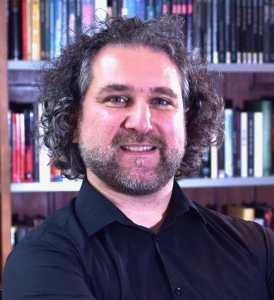#207– July 10, 2023

https://www.youtube.com/watch?v=r5kHHGgf7Uk
Rapsodia Latina, by Uruguayan-Venezuelan composer, arranger, and flutist Efraín Oscher is our Composition of the Week.
“Rapsodia Latina was written especially for virtuoso trumpeter Fabio Brum, this piece visits the birthplaces of Latin music such as the Caribbean Sea and Brazil in three continuous movements, to be played with three different trumpets. The bright opening recalls the flavor of the Cuban rhythm of Guajira which was made famous by the iconic song Guantanamera. The orchestra provides a rather percussive texture and establishes a dialog with the powerful sound of the trumpet in Bb, creating an exhilarating energy that contrasts with the melancholic middle section, impregnated with the African-flavored rhythm of Guaguancó. After a brief cadenza, the orchestra sets the romantic mood to a mellow Bolero giving the soloists enough time to change to the flugelhorn. With a charming tenor voice, the flugelhorn engages with the orchestra exploring the rich harmonies and enchanting melodic turns of the Bolero, king of the Latin music of love and romantic sorrow. In the third section, we visit the birthplace of Fabio Brum, Brazil, embracing its national music, the Choro. A cousin of the samba, the Choro retains the samba’s up-tempo and high rhythmical energy while prescinding from the big drum group; in fact, it is mainly accompanied by guitar and pandeiro (Brazilian tambourine). The piccolo trumpet allows the soloist to display with clarity the complex rhythms and melodic figures characteristic of this happy style of music, reaching with ease the high register typical of an oboe or a clarinet.” (Program Notes by Efraín Oscher)
The work exists in three different versions, all of them premiered by Fabio Brum.
One for chamber orchestra, premiered in Germany in October 2018, with the “Kammerorchester Konsonanz”, Bremen, under Pacho Flores. The wind band version was premiered in Córdoba, Spain, in 2019. The full orchestra version was played for the first time in February 2020 in Antofagasta, Chile, and received further performances in England and in Sweden.
Rapsodia Latina is scored for a standard concert band setting and has a duration of 14 minutes.
The soloist alternates, as mentioned above, the trumpet, as well as the piccolo trumpet in the fast moments of the rhapsody, and the flugelhorn for the more lyrical ones.
Efrain Oscher was born in Montevideo (Uruguay) in 1974 and grew up in Venezuela. He began his musical career as a flutist in the Venezuelan youth orchestra project “El Sistema”, founded by José Antonio Abreu. He also studied music at the Conservatorio de Música de Carabobo in Valencia (Venezuela).
Oscher was a member of the Orquesta Sinfónica de Carabobo as well as principal flutist in the Orquesta Municipal Ciudad de Valencia. As a soloist, he has performed with the Orquesta de Cámara de la Universidad de Carabobo, the Orquesta Filarmónica del Caribe and the Orquesta Sinfónica Francisco de Miranda, among others.
Oscher lives since 2000 in Europe. He studied with William Bennett at the Royal Academy of Music in London, where he graduated with a concert diploma in 2003 and received the Benjamin Dale Award. During his time in the UK, he was a soloist in the Bath International Music Festival and the English Chamber Orchestra Young Artist Series, among others.
His music for orchestra has already been performed in Europe (Die Deutsche Kammerphilharmonie Bremen, Konzerthausorchester Berlin, Joven Orquesta Autónoma de Cantabria, London Schools Symphony Orchestra, Norddeutsche Philharmonie Rostock, Nuevo Mundo Chamber Orquesta, Orchester der Deutschen Oper Berlin, Orquesta Filarmónica de Gran Canaria, Orquesta Filarmónica de Málaga, Orquesta Simfónica de les Illes Balears, Prague Radio Symphony Orchestra, Symphonisches Orchester Mainz, Stavanger Symfoniorkester) and in Latin America (Venezuela, Brasil, Mexico, Puerto Rico).
Efraín Oscher’s music is characterized by a cultural and stylistic openness. Influenced by Bach, Debussy, Poulenc, and Ravel combined with the polyrhythmical and polymetrical structures of Latin America’s music. He is not concerned with playing with tones, but with stories and messages. Oscher’s works are also marked by political commitment.
“Escenas del Sur” protests against dictatorial governments that plunge their peoples into endless suffering. And “Green Concerto” deals with the beauty and destruction of nature.
More on Efrain Oscher
https://www.efrainoscher.com


